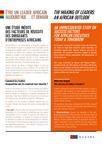
The Making of Leaders: An African Outlook
Success factors for African executives today & tomorrow
As economic acceleration continues across the Continent, the need for high-level executive talent intensifies. As companies expand their regional footprints and scale up operations, the particular executive, capable of working across diverse cultures, geographies, and demographics, is all the more rare.
What has forged the success of today’s leaders?
Is there a formula for success? Are there patterns or areas of convergence? And similarly, are there specificities linked to the African context or do the classic principles of leadership apply? The study considered how CEOs interpret their own success and sought the Gen Y’s feedback on how they perceive current leaders’ success. The qualitative interviews, conducted with 50 CEOs, revealed three noteworthy findings regarding what they believed were their main sources of success:
- Resourcefulness: Against the backdrop of the high-growth/unpredictable African business environment, CEOs are used to facing situations where things do not go as planned. Whereas creative problem-solving in developed countries is called “innovation,” on the continent that has leap-frogged its way to the future through frugal innovations, CEOs prize “resourcefulness” above all else.
- Team-Builder: The myth of the providential man – the leader of the tribe or the shaman – belongs to the past and to caricature. Modern African CEOs are very much committed to succeed as a team. It is not a zero-sum game, so commitment to the team, to the whole and not the individual parts, is essential.
- Ego under control: “You have to walk with kings but keep your head.” There is a tension around the role of ego. Ego is part of the job and in most places there is culture of hierarchy, which reinforces the leader’s role as a figure of authority. Yet, too much ego is seen as the number one cause of failure for African CEOs. The art of leading in Africa comes in balancing humility with the audaciousness to challenge “business as usual.”
The Gen Y is largely in agreement about what attributes make up a successful leader, converging on these same traits as the ones they admire most in inspiring leaders. However, they do not see their own development path to executive leadership in the same way.
What are the drivers of the Gen Y to leverage for better leadership development?
Through the research, Millennials in Africa expressed 5 key desires that should influence how companies think about attracting them, developing them, and leveraging their talents.
- The Gen Y in Africa is highly ambitious, and companies can creatively channel these energies towards joint objectives.
- To engage the Gen Y, they want to be empowered on projects that count, which requires new risk-mitigating strategies.
- The Gen Y prefers personal development and career progression over brand or money.
- The Gen Y wants to work hard, but smarter, with tech-savvy solutions.
- Forget the brain-drain, the Gen Y wants to build the new Africa.
Download the complete study from 4 p.m. GMT on 21/03/2016






